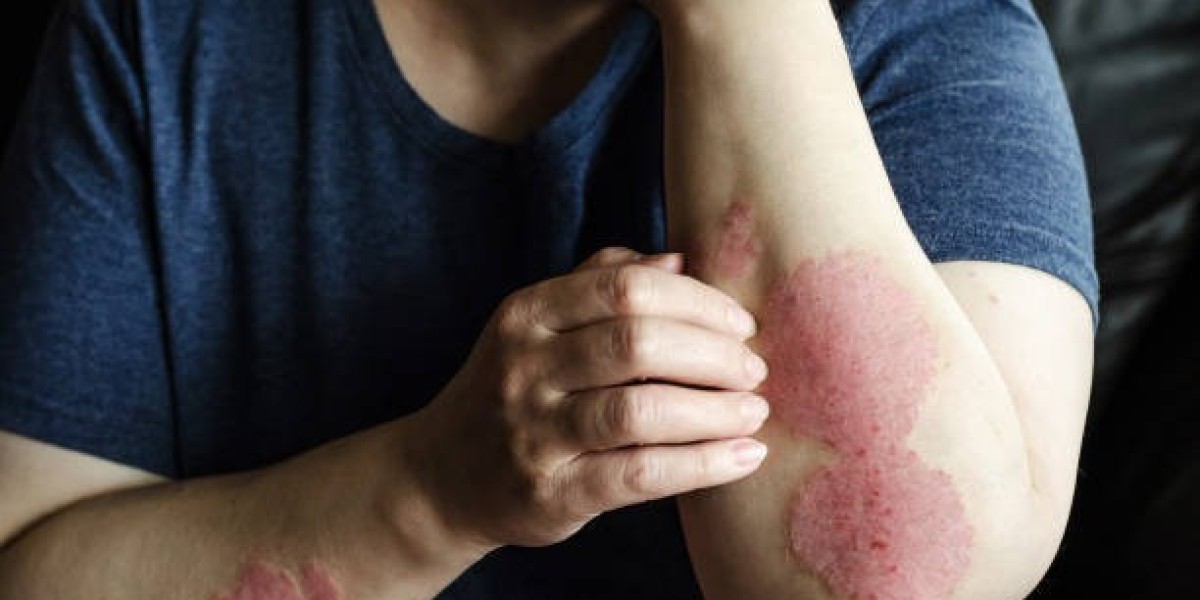Psoriasis is a chronic skin condition that causes red, scaly patches on the skin. It can significantly impact quality of life, affecting not only appearance but also comfort and overall well-being. For those seeking relief, psoriasis treatment in Riyadh offers a range of advanced solutions tailored to manage and alleviate symptoms effectively. In this blog, we’ll explore the most effective treatments available, discuss their benefits, and provide guidance on choosing the right approach for your needs.
Understanding Psoriasis
What is Psoriasis?
Psoriasis is an autoimmune disorder that speeds up the growth cycle of skin cells, leading to thick, scaly patches on the skin. These patches can appear anywhere on the body but are most commonly found on the scalp, elbows, knees, and lower back.
Types of Psoriasis
There are several types of psoriasis, including:
- Plaque Psoriasis: Characterized by dry, raised, red skin lesions covered with silvery scales.
- Nail Psoriasis: Affects the nails, causing pitting, abnormal nail growth, and discoloration.
- Guttate Psoriasis: Often starts in childhood or young adulthood, presenting as small, water-drop-shaped, scaling lesions.
- Inverse Psoriasis: Causes bright red, shiny, and smooth patches of skin, typically found in skin folds.
- Pustular Psoriasis: Features white pustules (blisters of noninfectious pus) surrounded by red skin.
Treatment Options for Psoriasis in Riyadh
Topical Treatments
Topical treatments are applied directly to the skin and are often the first line of defense against psoriasis. Common topical treatments include:
Steroid Creams
Steroid creams are the most commonly prescribed topical treatment. They work by reducing inflammation and slowing the growth of skin cells. While effective, they should be used under the guidance of a professional to avoid potential side effects.
Vitamin D Analogues
These treatments help to slow down skin cell growth and reduce inflammation. They are often used in combination with other topical treatments for enhanced effectiveness.
Tar Products
Coal tar can reduce scaling, itching, and inflammation. It is available in various forms, including shampoos, creams, and ointments.
Phototherapy
Phototherapy involves exposing the skin to controlled amounts of natural or artificial light. This treatment helps to slow down the rapid growth of skin cells and can be an effective option for those who do not respond well to topical treatments.
UVB Therapy
UVB therapy involves exposing the skin to ultraviolet B light. This type of phototherapy is often used for moderate to severe psoriasis and can be performed in a clinical setting.
PUVA Therapy
PUVA therapy combines ultraviolet A (UVA) light with a medication called psoralen, which makes the skin more sensitive to light. This treatment can be effective for severe cases of psoriasis but requires careful management to avoid potential side effects.
Systemic Treatments
Systemic treatments work throughout the body and are generally used for more severe cases of psoriasis. These treatments can be administered orally or through injections.
Oral Medications
Oral medications for psoriasis include drugs such as methotrexate, cyclosporine, and acitretin. These medications help to reduce the production of skin cells and suppress the immune system.
Biologic Drugs
Biologic drugs are a newer class of medications that target specific parts of the immune system involved in psoriasis. They are typically used for moderate to severe psoriasis and are administered through injections.
Complementary and Alternative Therapies
In addition to conventional treatments, many people explore complementary and alternative therapies to manage their psoriasis. These can include:
Dietary Changes
Some studies suggest that certain dietary changes may help to improve psoriasis symptoms. For example, increasing the intake of omega-3 fatty acids and reducing the consumption of inflammatory foods may be beneficial.
Stress Management
Stress can trigger or exacerbate psoriasis symptoms. Techniques such as yoga, meditation, and deep breathing exercises can help manage stress and potentially reduce flare-ups.
Herbal Remedies
Herbal remedies such as aloe vera, turmeric, and green tea are often used to soothe the skin and reduce inflammation. While these can offer relief, they should be used in conjunction with, and not as a replacement for, conventional treatments.
Choosing the Right Treatment
Factors to Consider
When selecting a psoriasis treatment in Riyadh, several factors should be taken into account:
- Severity of Psoriasis: The choice of treatment often depends on the severity and type of psoriasis.
- Response to Previous Treatments: Previous treatment responses can guide the selection of new therapies.
- Lifestyle and Preferences: Personal preferences, lifestyle factors, and potential side effects should be considered.
Consult a Professional
For the best results, it is crucial to consult with a healthcare professional who specializes in skin conditions. They can provide personalized recommendations based on your specific needs and help you navigate the various treatment options available.
Conclusion
Effective psoriasis treatment in Riyadh involves a range of options, from topical treatments and phototherapy to systemic medications and complementary therapies. By understanding these treatments and working closely with a healthcare professional, you can find the most suitable approach to manage your psoriasis effectively. Whether you are seeking relief from symptoms or looking to explore new treatment options, Riyadh offers advanced solutions to help you achieve clearer, healthier skin.









